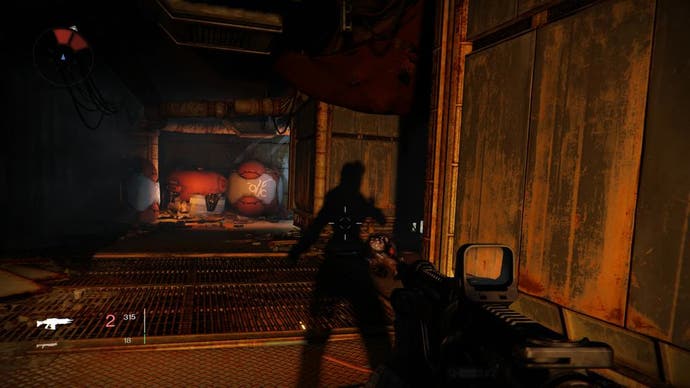Sophie Sampson on: Tutorial theatrics
Crossing the threshold.
Each spaceship holds a friend, and you're orbiting round a planet together in a gang, showing off your rides. Custom paint jobs. Some dude in a giant red lorry of a ship. Last minute gear checks, discussion of loadout and then your team all turns perfectly together and sideslips down to the planet's surface. A moment of black and you're in control of your avatar and everything kicks off. Or it's PvP and you teleport down to the planet's surface and are shown posed like you're in a Saturday morning TV show for a beat before the flag rolls out. A second to breathe and then you're being hunted. Destiny is full of these tiny moments that show you're with your tribe.
In the games you love you'll see those snippets between pressing play and actually starting to play hundreds of times. Eventually you'll get a Pavlovian reaction - hear that sequence of sounds and your fingers unconsciously curl into the right position and your brain wave pattern switches into a state of flow. It becomes ritual.
But the first time you play the game is different. It's all new and you're probably alone. You don't need your mates to see you like this. You're scanning everything you see, trying to understand what's important and what's just background dressing. The tutorial is being woken from the dead and learning to run and shoot and punch aliens in the face with your satisfyingly overpowered right arm. It's the first step towards being a hugely competent badass that is the particular joy of Bungie games.
Or, to look at it another way, it's a level designed around achieving a lot of minute shifts in player understanding. From the moment of getting control of your avatar and following the path into the buildings to find a gun, each thing the player is asked to do is meticulously balanced so that no one will feel overwhelmed. Once you start breaking it down in the abstract, you can be surprised at how far they make you run before they let you have anything so distracting as a weapon. Long enough that you internalise what types of breaks in the ground you can run over (basically all of them, this isn't a game where you are delicately unable to step over a 10cm gap between two pieces of flooring), and what gaps you can fit through (although crouch will be introduced later in the level. With lasers, like every ten-year-old's fantasy of what robbing banks would be like).

And then you pick up your first gun, and need to use it, then your second. You learn about the two colours of ammo drops, and that crouch sequence, and each thing is given time and space to bed in. And when you're looking at the tutorial as a series of shifts which can be diagrammed (and probably were, on a whiteboard in Bellevue), you can also be surprised at how taut with theatre it is. This opening section gives you context as to what the game cares about, and they're paying as much attention to emotion as to conveying the mechanics you need to learn. The story beat just before you wake up in a car graveyard is three of the Fallen displaying the universal body language of sentries who've seen something they should investigate. When you begin to run you're startled by the clatter of crows flapping up from the wreckage. The game wants you to be as unsettled as possible so that when you pick up your gun you'll be flooded with relief. Now you can fight back. This is an experience that knows how it wants you to feel and its makers are not ashamed to use every technique they can find to do that. It's a long time since I got an adrenaline rush from my own shadow in a game tutorial.
Similar structures exist in other contexts. By which I mean a managed series of shifts in understanding, accompanied by an emotional arc. Immersive theatre people, for example, are obsessed with the start of experiences. They call it thresholding. They care so much because they only get one chance a night to prime their players in how to play in the sandbox they've set up, and if it fails they have to watch people disengage from two feet away over the course of several hours, then do it again the next night.
Punchdrunk, one of the best known of those companies, often do this priming around a journey in a lift. Audience members arrive at a warehouse, line up chatting with their friends. Entirely themselves. The process of thresholding is about turning them from people into an audience with a sense of their own agency. The shift from 'out of game' to 'in game' is subtle but complete.
So, you're rounded up in a group of maybe twelve, and each given a mask, and told the basic ground rules ("no talking, no phones, do not take your mask off unless you're in the bar.") Then herded into the lift. And in the short space of a lift journey the group of friends and strangers are turned into audience who will drift through the world like ghosts. They put their masks on when told, and the performer's speech subtly shifts from out of game to more and more inside the game world. They keep the focus on themselves hypnotically, insistently.
And then the lift stops - it's not a long journey - and some people are pushed out at random, into the darkness, and the lift door is slammed shut again. Everyone still inside instinctively huddles closer together, but they're going to be herded out at one stop or another. And then it's your turn and you stumble out into a street, or a forest, or a sandy desert that smells of incense and cordite, and start to look around at what might be important and how you can have agency in this world.
For a game person, what happens next maybe lacks goals or meaningful player actions apart from exploration. It's immersive more than interactive. But, that doesn't mean it isn't a really useful experience to slice and dice to get at its core. Talented people are putting all their energy into that immersion. That's always worth looking at, because then you get to look back at your own world with fresh eyes and see what they know that you haven't figured out how to do yet.
We're tribal creatures, generally. Bad at looking at what we experience abstractly, uncoloured by emotion. But one of the things I love about games is how we get theatre and maths and behavioural economics to play together, all in service of the game. To do that well we have to be able to look past tribal boundaries. It's not just Punchdrunk. If a tutorial is a threshold and a series of shifts in player understanding, you can start comparing entirely different thresholding experiences, from extreme sports to Palladian architecture to doing your taxes. Every tribe - BASE jumpers as much as architects and accountants - come at the problem with different tools and assumptions.
And so as a tribe we might take off our game police hats and remember that there's a whole world out there of people making things that aren't games, or are a bit gamelike, and that's great. Even if some of them - tax returns for example - are crying out for a mechanic where you can punch aliens in the face and see their marionette bodies fly. Accountants really need to work on their emotional arcs.









